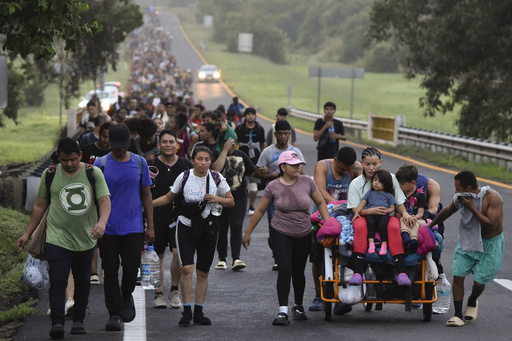WASHINGTON — Following his election, Donald Trump has made it clear that he intends to eliminate birthright citizenship, fulfilling a campaign commitment that seeks to tighten immigration policies and reshape the definition of American identity.
However, any attempts to eliminate this policy would encounter substantial legal challenges.
Birthright citizenship grants automatic citizenship to anyone born on U.S. soil, a practice that has been in effect for many years. This applies not only to children born to U.S. citizens but also to those born to individuals without legal residency or those visiting on tourist or student visas who intend to return to their home countries.
This approach is not universally adopted around the world, leading Trump and his supporters to argue that the current system is being exploited and that stricter requirements should be established for citizenship.
Conversely, critics assert that birthright citizenship is a right protected by the 14th Amendment of the Constitution, making it particularly hard to overturn. Even if it could be repealed, many believe that doing so would be detrimental to the nation.
In a recent interview on NBC’s “Meet the Press,” Trump reaffirmed his commitment to ending birthright citizenship, stating it is “ridiculous” and asserting that it motivates illegal immigration and practices such as “birth tourism,” where expectant mothers enter the U.S. to give birth and secure citizenship for their children before going back to their native countries.
Eric Ruark, research director at NumbersUSA, a group advocating for reduced immigration, claimed that simply entering the U.S. and having a child should not automatically confer citizenship. He suggested that changes should be made requiring at least one parent to be a permanent resident or a U.S. citizen for children to gain citizenship.
Critics highlight the potential negative consequences of removing birthright citizenship. Alex Nowrasteh from the Cato Institute emphasized that one of the key advantages of the current system is that children born in the U.S. are recognized as citizens, enhancing their integration and assimilation within society.
According to a 2019 study by the Migration Policy Institute, approximately 5.5 million children under 18 lived with at least one undocumented parent, accounting for about 7% of the U.S. child population, the majority of whom were U.S. citizens. The institute warned that if birthright citizenship were to be rescinded, it could lead to a significant increase in the undocumented population, thereby creating a cycle of exclusion from social acceptance for decades.
Legally, the 14th Amendment was ratified by Congress in 1868 in response to the Civil War and guarantees citizenship to all individuals born or naturalized in the U.S. The amendment states, “All persons born or naturalized in the United States and subject to the jurisdiction thereof, are citizens of the United States.” However, the application of this amendment has evolved over time. For instance, it wasn’t until 1924 that citizenship was granted to all Native Americans born in the U.S.
An important legal precedent regarding birthright citizenship was set by the Supreme Court in 1898 when it ruled that Wong Kim Ark, born to Chinese immigrants in San Francisco, was a U.S. citizen. The federal government’s attempt to deny his reentry under the Chinese Exclusion Act was deemed invalid by the court. Nonetheless, there are still discussions about whether this ruling applies to children of undocumented immigrants or those visiting the U.S. temporarily.
Some advocates for immigration reform argue that the phrase “subject to the jurisdiction thereof” in the 14th Amendment allows the U.S. to deny citizenship to babies born to those without legal status. Trump also referenced this language during his announcement of intentions to end birthright citizenship in his 2023 campaign.
As for the methods Trump could pursue to abolish birthright citizenship, he has yet to provide a detailed strategy. When asked about executive actions he could take, Trump mentioned the need to change the current laws, suggesting that he might seek a public mandate to support his ambitions.
In a 2023 statement on his campaign website, Trump elaborated on his plan to issue an executive order on his first day in office, which would declare that at least one parent must be a U.S. citizen or a lawful permanent resident for their children to receive automatic citizenship.
He also indicated that children of undocumented immigrants should be ineligible for certain benefits, such as passports or Social Security. However, experts predict that such an order would likely lead to legal disputes.
Nowrasteh pointed out that the legalities surrounding birthright citizenship cannot be altered through an executive order, and he expressed skepticism about Trump’s capability to advance this agenda as he has made similar claims for years without substantial progress during his previous presidency.
If Trump attempts to push Congress to pass legislation to end birthright citizenship, he would still encounter formidable legal opposition, as such a move could be perceived as a violation of the Constitution.


